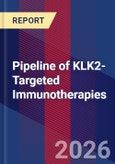Kallikrein-related peptidase 2 (KLK2) is a trypsin-like serine protease predominantly expressed in the prostate, and like PSA, KLK2 is regulated by androgens via androgen receptor (AR) signaling. Its normal physiological function includes the activation of pro-PSA and involvement in seminal clot liquefaction through the cleavage of semenogelins. Functionally, KLK2 can also activate other proteases and cleave extracellular matrix proteins, facilitating tumor invasion and metastasis.
Elevated KLK2 expression has been observed in prostate cancer tissues, with increased levels associated with high-grade tumors, metastatic potential, and biochemical recurrence after treatment. KLK2 also has restricted expression in prostate tissues, offering a promising profile for targeted therapy.
Recently published daa has shown high level KLK2 expression from localized prostate cancer through heavily treated metastatic castration-resistant prostate cancer, with even higher levels, homogenous immunostaining compared to PSMA. Importantly, KLK2 was found to be expressed on the surface of prostate cancer cells, rendering it accessible for targeting.
Preclinical studies have successfully shown prostate cancer cell targeting using various therapeutic modalities, including a T-cell engaging bispecific antibody and KLK2-targeted CAR-T cells. Preliminary clinical study results demonstrated early efficacy in a metastatic castration-resistant prostate cancer population, with incredibly low rates of treatment related adverse events. Thus, KLK2 represents a promising drug target in prostate cancer.








